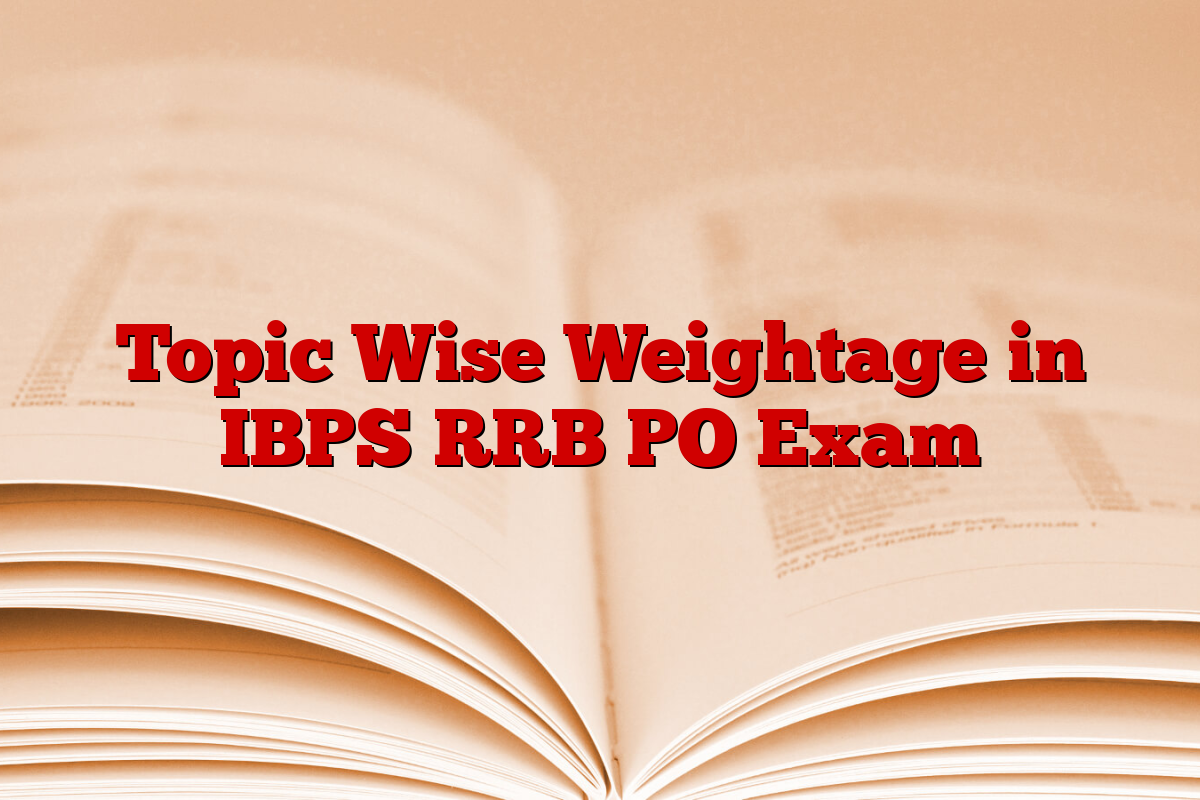Understanding subject-wise weightage in IBPS RRB PO exam is important for smart preparation. By analyzing last year’s trends, candidates can identify high priority subjects and allocate their time accordingly. Sections with logic and quantitative qualifications, who carry every 40 digits, play an important role in prelims. With recurring patterns and major themes in both classes, a theme-wise strategy can significantly increase your possibilities of cleaning the cutoff.
IBPS RRB PO Exam Structure
IBPS RRB PO exam is conducted in three stages
- preliminary examination
- Main examination
- Interview
There is a breakdown of classes in each stage:
- Preliminary Examination (80 marks)
- Logic capacity (50% = 40 digits)
- Quantitative qualification (50% = 40 digits)
- Main Exam (200 marks)
- Logic capacity (25% = 50 digits)
- Quantitative qualification (25% = 50 marks)
- English/Hindi language (20% = 40 digits)
- General awareness (20% = 40 digits)
- Computer knowledge (10% = 20 digits)
Candidates should do smart work to increase the chances of selection and secure a situation IBPS RRBThey should prepare according to the subject-wise weightage. For example, as in prelims examination, data interpretation forms approximately 25% to 40% quantitative qualification section, while more than 50% logic sections come from the question puzzles and seating arrangements.
IBPS RRB PO Examination Subject War Weightage
Subject-wise weightage of logic
The logic section tests the logical thinking and problem-solution skills of the candidate. There is a weightage for various subjects here.
| Subject-wise weightage of logic | ||||||
| Subject | overall | 2024 | 2023 | 2022 | 2021 | 2020 |
| Puzzle and seating arrangement | 20-25 | 24 | 23 | 20 | 22 | 25 |
| Alphabet/ Number Series | 2-3 | 1 | 0 | 3 | 0 | 3 |
| Inequality | 3-5 | 4 | 4 | 4 | 5 | 3 |
| Blood relation | 2-4 | 3 | 0 | 4 | 3 | 0 |
| Syllasia | 2-3 | 3 | 3 | 3 | 3 | 0 |
| Direction | 3-4 | 3 | 3 | 3 | 4 | 3 |
| Coding-decoding | 4-5 | 0 | 5 | 0 | 0 | 5 |
| miscellaneous | 3-4 | 2 | 2 | 3 | 3 | 1 |
| Total | 40 | |||||
Analysis of subject-wise weightage of logic from the above table:
- The puzzle and seating arrangement dominate the section with 20–25 questions continuously, making them the most important subjects to master them.
- Inequality appears regularly with 3-5 questions each year, showing its constant appearance in the examination.
- Sylogism and Direction Sense have also maintained a stable appearance, usually 3-4 questions contributed.
- Coding-decoding shows variation, absent over the years, but firmly returned with 5 questions in 2023 and 2020.
- The alphabet/number chain and blood relations appear to stop, so they should not be completely ignored.
- Various logic questions, although low, can test a variety of logic-based subjects, they are worth the light modification.
Quantitative qualification
Quantitative qualification assesses numerical ability and analysis. Subject-wise weightage is tabulated below
| Quantitative qualification | ||||||
| Subject | overall | 2024 | 2023 | 2022 | 2021 | 2020 |
| data interpretation | 10-17 | 11 | 15 | 13 | 17 | 10 |
| Simplification and interaction | 4-5 | 5 | 4 | 5 | 5 | 0 |
| quadratic equation | 3-5 | 5 | 2 | 5 | 0 | 5 |
| Number chain | 5 | 5 | 5 | 5 | 6 | 5 |
| Arithmetic | 12-13 | 14 | 12 | 12 | 12 | 15 |
| miscellaneous | 3-5 | , | 2 | , | , | 5 |
| Total | 40 | |||||
Analysis of subject-wise weightage of quantitative qualification from the above table:
- The arithmetic is the backbone of the section, contributes 12–15 questions every year.
- Data Interpretation (DI) also holds major weight, which contains 10–17 questions based on charts, graphs and tables – aggressive to high scoring.
- The number series is a scoring theme, which shows 5 questions every year.
- Simplification and adjacent is common, especially for candidates targeting speed-based scoring.
- The quadratic equations have appeared variablely appeared, but remain important when they are present.
- Various questions vary according to the year, so it is useful to brush on subjects like possibility, age, partnership, etc.
Knowing the subject-wise weightage for the IBPS RRB PO exam helps candidates in their preparation and focuses on the areas that take more marks. With structured preparation and coherent practice, candidates can increase success prospects in this competitive exam. You get success!

